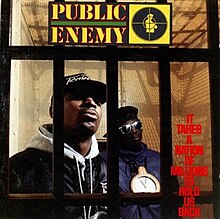| It Takes a Nation of Millions to Hold Us Back | ||||
|---|---|---|---|---|
 | ||||
| Studio album by | ||||
| Released | June 28, 1988[1] | |||
| Recorded | 1987–1988 | |||
| Studio |
| |||
| Genre | ||||
| Length | 57:51 | |||
| Label | ||||
| Producer | ||||
| Public Enemy chronology | ||||
| ||||
| Singles from It Takes a Nation of Millions to Hold Us Back[6] | ||||
| ||||
It Takes a Nation of Millions to Hold Us Back is the second studio album by American hip hop group Public Enemy, released on June 28, 1988,[7] by Def Jam Recordings and Columbia Records. It was recorded from 1987 to 1988 in sessions at Chung King Studios, Greene St. Recording, and Sabella Studios in New York.
Noting the enthusiastic response toward their live shows, Public Enemy intended to make the album's music at a higher tempo than their 1987 debut Yo! Bum Rush the Show for performance purposes. The group also set out to create the hip hop equivalent of Marvin Gaye's What's Going On (1971), an album noted for its strong social commentary. Through their production team the Bomb Squad, Public Enemy introduced a densely aggressive sound influenced by free jazz, heavy funk, and musique concrète as a backdrop for lead rapper Chuck D, who employed sociopolitical rhetoric, revolutionary attitudes, and dense vocabulary in his performances.[8]
It Takes a Nation of Millions to Hold Us Back charted for 47 weeks on the US Billboard 200, peaking at number 42, and was certified Platinum by the RIAA in 1989. The album received widespread acclaim from critics, who praised its production techniques and Chuck D's socially and politically charged lyricism. It also appeared on many publications' year-end top album lists for 1988 and was the runaway choice as the best album of 1988 in The Village Voice's Pazz & Jop critics' poll, a poll of the leading music critics in the US.[9]
Since its initial reception, It Takes a Nation of Millions to Hold Us Back has been regarded by music writers and publications as one of the greatest and most influential albums of all time.[10][11] In 2000, it was voted number 92 in Colin Larkin's book All Time Top 1000 Albums,[12] and in 2003, it was ranked number 48 on Rolling Stone magazine's list of the 500 greatest albums of all time, the highest ranking of all the hip hop albums on the list, and the only one acknowledged in the top 100. In the 2020 version of the same list, the album was ranked number 15, while other hip-hop albums moved into the top 100.
- ^ "The Source |Today in Hip Hop History: Public Enemy's 'It Takes a Nation of Millions to Hold Us Back' Turns 33 Years Old!". 28 June 2021.
- ^ Smith, Chris (2009). 101 Albums that Changed Popular Music. Oxford University Press. p. 194. ISBN 978-0195373714.
- ^ Cader, Michael, ed. (2002). People: Almanac 2003. Time Home Entertainment. p. 175. ISBN 192904996X.
- ^ Shipley, Al. "10 Ways To Sound Smart Talking About Rap Beats". Complex Magazine. Retrieved 16 June 2018.
- ^ "Top 100 Albums". Entertainment Weekly. 27 September 2012. Retrieved 12 October 2024.
- ^ Strong (2004), p. 1226.
- ^ "The Source |Today in Hip Hop History: Public Enemy's 'It Takes a Nation of Millions to Hold Us Back' Turns 33 Years Old!". 28 June 2021.
- ^ Erlewine, Stephen Thomas (2008). "All Music Guide Required Listening: Public Enemy". In Woodstra, Chris; Bush, John; Erlewine (eds.). Old School Rap and Hip-Hop. Backbeat Books. p. 70. ISBN 9780879309169.
- ^ Hilburn, Robert (February 4, 1990). "Rap—The Power and the Controversy : Success has validated pop's most volatile form, but its future impact could be shaped by the continuing Public Enemy uproar". Los Angeles Times. Los Angeles Times. Retrieved 2012-06-07.
- ^ Cite error: The named reference
RS90swas invoked but never defined (see the help page). - ^ Cite error: The named reference
TheSourcePEwas invoked but never defined (see the help page). - ^ Colin Larkin (2000). All Time Top 1000 Albums (3rd ed.). Virgin Books. p. 72. ISBN 0-7535-0493-6.